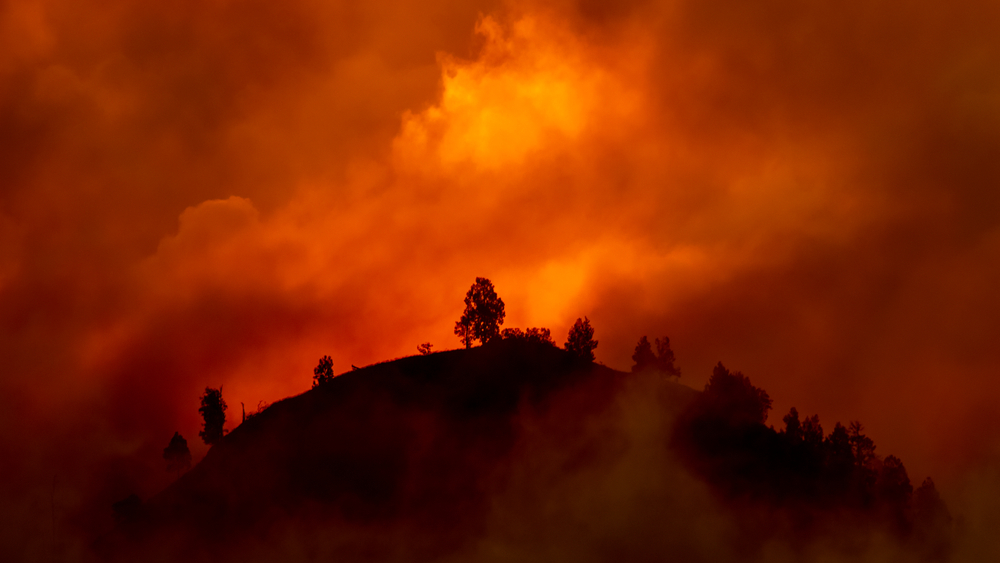EU wildfires in 2022: Second-worst year to date
- November 22, 2023
- 10:51 am


Iain Hoey
Share this content
In 2022, the European Union (EU) experienced its second-worst year for wildfires, raising alarm over the escalating impacts of climate change.
A significant area, comparable in size to Corsica, was ravaged by fires across the EU.
The Joint Research Centre’s latest report highlights this environmental calamity, accentuating the persistent threat of wildfires in the region.
- EU wildfire’s Devastating toll on land and biodiversity
- Human actions and climate change: A perilous combination
- Prevention and management efforts
- Global perspective on wildfire trends
- EFFIS: A key tool in wildfire management
- EU’s strategic approach to wildfire mitigation
- Strengthening EU’s firefighting capabilities
- Commissioner Ivanova’s remarks
EU wildfire’s Devastating toll on land and biodiversity
The report revealed that nearly 900,000 hectares of land were scorched in 2022, including approximately 365,000 hectares within the Natura 2000 sites.
This figure represents the highest amount of burnt land in Natura 2000 protected areas in a decade.
The toll on these critical biodiversity reserves underscores the widespread nature of the wildfires.
Human actions and climate change: A perilous combination
Human activities have been identified as the primary cause of these wildfires, accounting for 96% of the incidents.
Climate change exacerbates the situation by creating more favourable conditions for fires to ignite and spread.
This deadly combination poses a significant threat to both the environment and human safety.
Prevention and management efforts
Despite these challenges, the EU has implemented effective prevention measures and firefighting strategies, which have successfully contained the number of casualties.
The EU Nature Restoration Law and the Forest Monitoring Law proposals are among the initiatives aimed at improving Europe’s ecosystem resilience and forest data accuracy, crucial for better wildfire management.
Global perspective on wildfire trends
The increasing frequency and intensity of wildfires are not confined to Europe.
In recent years, regions like Chile, Canada, California, Australia, and South America have also experienced significant wildfire activity, often surpassing traditional patterns.
EFFIS: A key tool in wildfire management
The European Forest Fire Information System (EFFIS) has been instrumental in providing harmonised information on forest fires and assessing their effects across Europe.
Since its inception as a pilot project, EFFIS has expanded to include 43 countries, offering a platform for exchanging best practices in fire management.
EU’s strategic approach to wildfire mitigation
The EU’s Strategy on Adaptation to Climate Change and the Forest Strategy are central to its approach in mitigating wildfire impacts.
These strategies focus on enhancing fire prevention, climate resilience, and monitoring capabilities.
The guidelines emphasise vegetation management and reducing human-caused wildfire ignitions as key strategies.
Strengthening EU’s firefighting capabilities
In response to the escalating wildfire crisis, the EU has bolstered its Union Civil Protection Mechanism to augment aerial firefighting resources.
This enhancement, coordinated by the Emergency Response Coordination Centre, reflects the EU’s commitment to strengthening its response to wildfire emergencies.
Commissioner Ivanova’s remarks
Iliana Ivanova, Commissioner for Innovation, Research, Culture, Education and Youth, responsible for the JRC, commented: “Wildfires are becoming ever more frequent and cause more damage.
“This is a clear sign of the catastrophic impacts of climate change. We are reinforcing our prevention measures and building the capacities to respond to wildfires.
“The Joint Research Centre’s data and analyses are crucial in this effort.”
IFSJ Comment
The EU’s wildfire crisis in 2022 serves as a stark reminder of the growing challenges posed by climate change.
The frequency and severity of these fires devastate ecosystems and biodiversity and have profound economic and human costs.
The EU’s proactive approach, emphasising prevention, preparedness, and enhanced firefighting capabilities, is commendable.
However, the broader implications of these wildfires on global environmental health and safety cannot be overstated.
As the world grapples with the realities of a changing climate, the lessons learned and strategies developed by the EU will be invaluable for global wildfire management.

